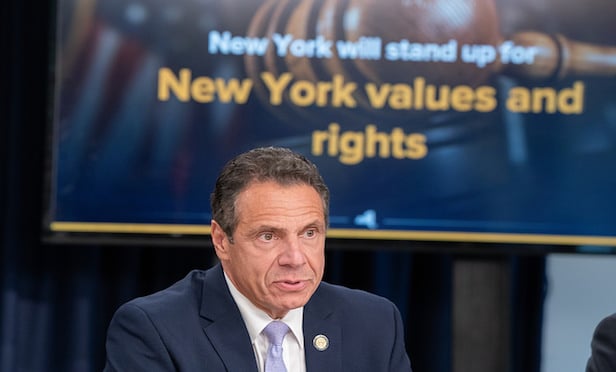NEW YORK CITY—Extending and strengthening the city's rent regulation is job one, Mayor Bill de Blasio and newly elected Assembly Speaker Carl Heastie said Sunday. The first joint public appearance of the mayor and speaker coincides with a new report that finds a shortage of affordable housing in New York and 10 other large cities.
Speaking with reporters after a private conference with Heastie and several tenants at the rent-stabilized Ebbets Field Apartments complex in Brooklyn, de Blasio reiterated the theme he had sounded in last week's State of the City address, calling affordable housing his administration's top priority. “That is not just building new buildings,” de Blasio said Sunday. “That is preserving the affordability we have.” Protecting rent laws covering the city's one million rent-stabilized units is a key aspect of that preservation, he added.
Heastie, who took the reins of the Assembly after the resignation of longtime Speaker Sheldon Silver, told reporters Sunday he had come to Ebbets Field “to let the tenants here know, and the mayor of the City of New York know, that this is going to be our No. 1 priority, to extend and strengthen rent regulation in the City of New York — to partner with the mayor in his vision for affordable housing.” He added that after a state budget is passed, “I don't know if there's a bigger issue for the Assembly to deal with.”
Neither man offered specifics on what he would do to ensure renewal of the city's rent regulation program, which is set to expire in June. The mayor said he will spell out his affordable housing plan in greater detail over the next couple of months, while Heastie said he would take it up with Democratic lawmakers in Albany.
Between 2006 and 2013, the supply of affordable rental housing failed to keep pace with demand in the 11 largest US cities while rents rose faster than household incomes in five of them, according to the NYU Furman Center/Capital One National Affordable Rental Housing Landscape report, issued Monday. With the exception of those in Dallas and Houston, the average renters in these cities couldn't afford the majority of recently available rental units.
In the case of New York, Los Angeles, San Francisco, Boston and Miami, moderate-income renters could afford less than a third of recently available units in '13, the most recent year covered by the study. The cities in the study were even less affordable to low-income renters, who could afford no more than 11% of recently available units in the most affordable cities.
“A substantial majority of low-income renters in these cities face rents equal to half or more of their income,” says Ingrid Gould Ellen, faculty director of the NYU Furman Center. “Our research shows that, in many cities, a growing share of moderate-income renters are severely rent-burdened as well.”
© Touchpoint Markets, All Rights Reserved. Request academic re-use from www.copyright.com. All other uses, submit a request to [email protected]. For more inforrmation visit Asset & Logo Licensing.






